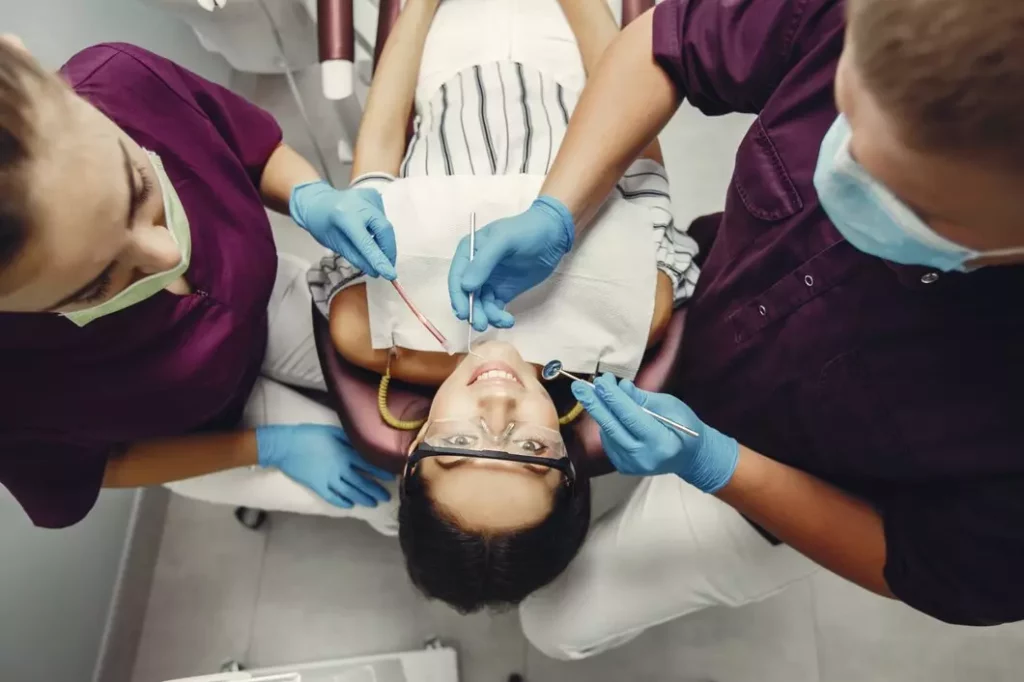Our team of skilled dentists is committed to providing top-quality dental crown treatments located nearby Clifton, NJ using advanced techniques and materials. Whether you require a dental crown to restore a damaged tooth or enhance the appearance of your smile, we are here to deliver personalized and high-quality care.
Importance Of Dental Crowns:
Dental crowns play a vital role in restorative and cosmetic dentistry, offering a range of benefits for individuals with damaged, decayed, or aesthetically compromised teeth. Here are the key reasons highlighting the importance of dental crowns:
- Restoring Tooth Structure: Dental crowns are designed to cover and protect damaged or weakened teeth. They provide a durable and protective layer that encases the entire visible portion of the tooth above the gumline. By providing support and stability, dental crowns help restore the tooth’s structure and prevent further damage or decay.
- Strengthening Weakened Teeth: Teeth that have undergone extensive dental procedures, such as root canal therapy or large fillings, may become weakened over time. Dental crowns provide reinforcement and strength to these weakened teeth, allowing them to withstand the pressures of biting and chewing.
- Enhancing Aesthetics: Dental crowns can significantly improve the appearance of teeth. They are custom-made to match the color, shape, and size of natural teeth, resulting in a seamless and natural-looking smile. Dental crowns can effectively conceal discoloration, misshapen teeth, or gaps, enhancing the overall aesthetics of the smile.
- Protecting Vulnerable Teeth: Teeth that have undergone root canal treatment or have extensive decay are more susceptible to further damage. Dental crowns act as protective barriers, shielding vulnerable teeth from bacteria, food particles, and other harmful substances that can cause reinfection or decay.
- Restoring Functionality: Damaged or decayed teeth can negatively impact the ability to bite, chew, and speak properly. Dental crowns restore functionality by providing a stable biting surface and improving the alignment of the teeth. This allows individuals to comfortably and efficiently perform essential oral functions.
Benefits Of Dental Crowns:
Dental crowns offer a multitude of benefits that contribute to both oral health and overall well-being. Let’s explore the key advantages of dental crowns:
- Natural-Looking Results: Dental crowns are custom-made to closely resemble natural teeth, ensuring a seamless and aesthetically pleasing result. They are carefully crafted to match the color, shape, and size of surrounding teeth, enhancing the smile’s appearance.
- Improved Oral Function: Dental crowns restore proper biting and chewing functionality. By providing a strong and stable biting surface, they enable individuals to enjoy a wide variety of foods, enhancing their nutritional intake and overall well-being.
- Longevity and Durability: Dental crowns are known for their durability and longevity. Made from high-quality materials such as porcelain or ceramic, they are resistant to wear and can withstand normal biting and chewing forces. With proper care and maintenance, dental crowns can last for many years, providing long-term benefits.
- Protection and Prevention: Dental crowns act as protective shields, safeguarding vulnerable teeth from further damage or decay. They provide an extra layer of defense, preventing the need for more extensive and costly dental treatments in the future.
- Boosted Self-Confidence: Dental crowns can have a significant impact on self-confidence and self-esteem. By enhancing the appearance of the smile and restoring damaged or decayed teeth, individuals regain their confidence to smile, speak, and interact with others without hesitation or embarrassment.

Understanding Dental Crowns:
Dental crowns, also known as dental caps, are prosthetic restorations that are placed over damaged, decayed, or aesthetically compromised teeth. They are designed to mimic the natural shape, color, and function of teeth, providing a durable and aesthetically pleasing solution.
Dental crowns can be made from various materials, including porcelain, ceramic, metal alloys, or a combination of materials. Each type of material has its own set of advantages, offering different levels of strength, aesthetics, and durability.
The dental crown procedure typically involves several steps. After a thorough consultation and evaluation, the tooth is prepared by removing any decay or damaged portions. An impression of the prepared tooth is then taken, and a temporary crown is placed while the permanent crown is being fabricated in a dental laboratory. Once the final crown is ready, it is securely bonded or cemented onto the tooth, restoring its appearance and functionality.
Dental crowns not only restore damaged teeth but also provide protection and aesthetic enhancements. They are a versatile and effective solution for various dental concerns, offering long-lasting results and improving overall oral health. With their ability to blend seamlessly with natural teeth, dental crowns provide individuals with a beautiful and functional smile they can confidently display.
Types Of Dental Crowns:
There are several types of dental crowns available, each with its unique characteristics and advantages. The choice of dental crown material depends on factors such as the location of the tooth, functional requirements, aesthetic preferences, and budget considerations. Here are common types of dental crowns:
- Porcelain Crowns: Porcelain crowns are highly aesthetic and can be matched to the natural color of adjacent teeth, making them ideal for front teeth. They provide excellent aesthetics, mimicking the translucent appearance of natural teeth.
- Ceramic Crowns: Ceramic crowns are similar to porcelain crowns in terms of aesthetics. They are metal-free, making them an excellent choice for individuals with metal allergies or sensitivities.
- Metal Crowns: Metal crowns, usually made of gold or base metal alloys, are known for their strength and durability. They are highly resistant to wear and tear and are often recommended for molars or teeth that require significant strength.
- Porcelain-Fused-to-Metal (PFM) Crowns: PFM crowns combine the aesthetic appeal of porcelain with the strength of a metal substructure. They offer a natural appearance while providing durability and stability.
- Zirconia Crowns: Zirconia crowns are known for their exceptional strength and durability. They offer excellent aesthetics, making them a versatile option for both front and back teeth.
Indications For Dental Crowns:
Dental crowns are recommended for various dental conditions and situations. Here are some common indications for dental crowns:
- Tooth Decay: Dental crowns are used to restore teeth with extensive decay or large fillings that compromise the tooth’s structure and strength.
- Fractured or Cracked Teeth: Teeth that are fractured or cracked can be protected and strengthened with dental crowns.
- Root Canal Treated Teeth: After a root canal procedure, dental crowns are often placed to protect the treated tooth and restore its functionality.
- Misshapen or Discolored Teeth: Dental crowns can improve the appearance of misshapen or severely discolored teeth, enhancing the overall aesthetics of the smile.
- Teeth with Large Fillings: Teeth with large fillings may require dental crowns to provide additional support and prevent further damage.
Tooth Replacement: Dental crowns are used in conjunction with dental implants or dental bridges to replace missing teeth and restore oral function.
Dental Crown Procedure Near Me:
The dental crown procedure involves several stages and typically requires multiple dental visits. Here is an overview of the dental crown procedure:
- Consultation and Evaluation: During the initial consultation, the dentist will evaluate your oral health, discuss your concerns, and determine if a dental crown is the appropriate treatment for your condition. X-rays or impressions may be taken to assess the tooth’s structure and plan the treatment.
- Tooth Preparation: To accommodate the dental crown, the tooth receiving the crown is prepared. This involves removing a small portion of the tooth’s structure to create space for the crown.
- Impressions and Temporary Crown Placement: After tooth preparation, impressions of the tooth are taken to create a custom-made dental crown. A temporary crown is placed on the prepared tooth to protect it while the permanent crown is being fabricated in a dental laboratory.
- Crown Fabrication: In the dental laboratory, skilled technicians use the impressions to create a custom-designed dental crown. The crown is fabricated to match the color, shape, and size of your natural teeth, ensuring a seamless and natural-looking result.
- Final Crown Placement: Once the final crown is ready, it is securely bonded or cemented onto the prepared tooth. The dentist will ensure proper fit, function, and aesthetics, making any necessary adjustments for optimal comfort and appearance.
- Follow-Up Visits and Aftercare: After the dental crown is placed, follow-up visits may be scheduled to assess the fit, bite, and overall satisfaction. It’s essential to maintain good oral hygiene practices, including regular brushing, flossing, and attending routine dental check-ups to ensure the longevity and health of the dental crown.

Cost And Affordability:
When considering dental crown treatment, cost and affordability are important factors to take into account. The cost of dental crowns can vary depending on several factors, including the material used, the complexity of the case, the location of the dental practice, and any additional procedures required. Understanding the cost and exploring affordability options can help you make an informed decision. Here are some points to consider:
- Material Options: Dental crowns can be made from various materials, each with its own cost implications. Porcelain crowns tend to be more expensive due to their aesthetic qualities, while metal crowns are generally more affordable. Porcelain-fused-to-metal (PFM) crowns offer a balance between aesthetics and cost. Discussing material options with a dentist can help you determine which is the most suitable for your needs and budget.
- Insurance Coverage: Dental insurance plans may provide coverage for dental crown treatment, depending on your specific policy. Check with your insurance provider to understand the extent of coverage and any limitations or exclusions. Being aware of your insurance benefits can help you estimate the out-of-pocket expenses associated with dental crowns.
- Payment Plans and Financing: Many dental practices offer payment plans or financing options to make dental crown treatment more affordable. These arrangements allow you to spread the cost of treatment over time, making it easier to manage financially. Inquire with your dental provider about the availability of such options and the terms and conditions involved.
- Quality and Longevity: While cost is an important consideration, it’s crucial to prioritize quality and longevity when choosing dental crown treatment. High-quality materials and experienced dental professionals may come with a higher price tag but can provide better aesthetics, durability, and overall satisfaction. Investing in a reputable dental provider can save you from potential complications or the need for costly repairs in the future.
Finding Dental Crown Providers Near Me:
When searching for dental crown providers near you, it’s essential to find a reputable and reliable dental practice. Here are some steps to help you in your search:
- Local Directories and Online Resources: Local directories, such as online listings or community directories, can provide a list of dental practices near you. Additionally, online resources, including search engines and review websites, can offer valuable information about dental providers in your area.
- Recommendations: Seek recommendations from friends, family, or colleagues who have undergone dental crown treatment. They can provide insights into their experiences and recommend trusted dental providers.
- Read Patient Reviews: Online platforms and dental review websites often feature patient reviews and ratings for dental practices. Reading these reviews can give you an idea of other patients’ experiences and help you gauge the reputation and quality of the dental providers you are considering.
- Consultation Visits: Schedule consultation visits with potential dental providers. This allows you to meet the dentists in person, ask questions, and evaluate their expertise, communication style, and the overall atmosphere of the dental practice. During the consultation, discuss your concerns, treatment options, estimated costs, and any available financing options.
- Expertise and Technology: Consider the expertise and technology available at the dental practice. Advanced dental technology, such as digital imaging, CAD/CAM systems, or intraoral scanners, can enhance the accuracy and efficiency of dental crown treatment. Dentists with specialized training or extensive experience in restorative dentistry may be more equipped to provide optimal results.
Office Atmosphere and Patient Comfort: Pay attention to the office atmosphere and patient comfort during your consultation visit. A friendly and welcoming environment can contribute to a positive dental experience.
Visit Prestige Dental in Clifton, NJ, to experience our personalized and high-quality care for dental crowns. Our skilled professionals will assess your unique needs, discuss treatment options, and provide a tailored solution to address your dental concerns. Trust us to restore your smile’s beauty and functionality with our outstanding dental crown services locally near you.






